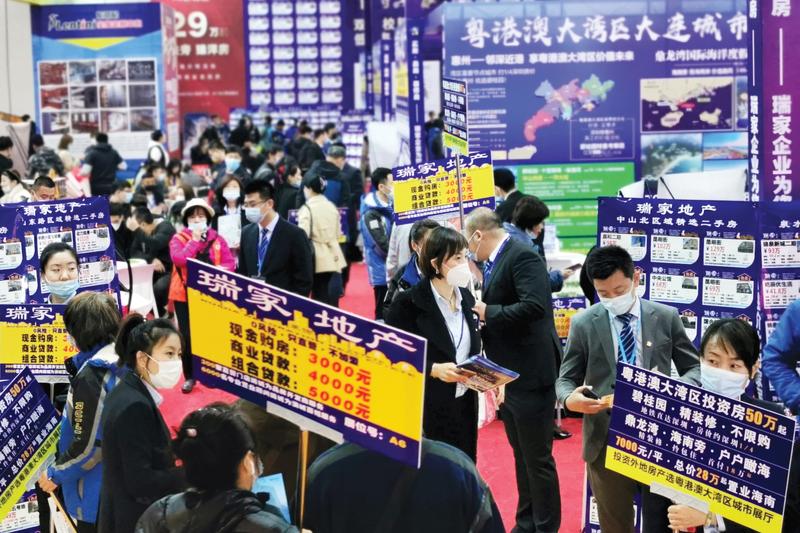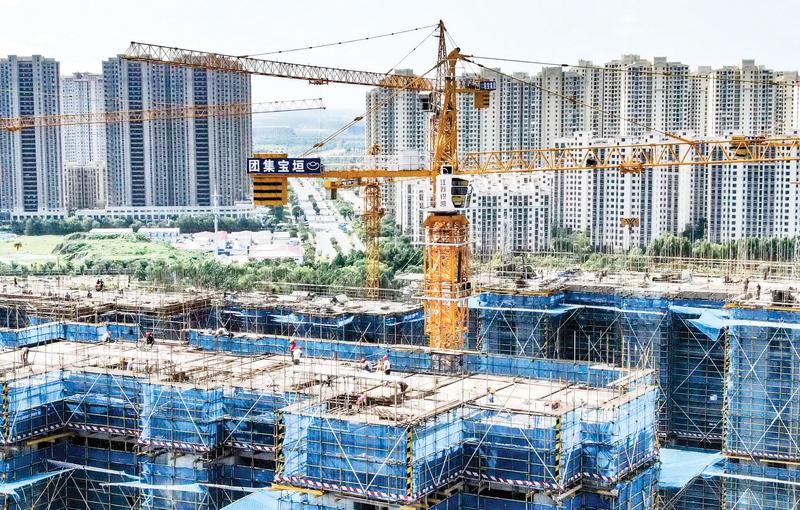 New homes on sale in Zhuhai, Guangdong province, on Aug 7. China has taken a number of measures in recent years to stabilize the property market and to realize the Chinese dream of all people having a home to live in. (PHOTO PROVIDED TO CHINA DAILY)
New homes on sale in Zhuhai, Guangdong province, on Aug 7. China has taken a number of measures in recent years to stabilize the property market and to realize the Chinese dream of all people having a home to live in. (PHOTO PROVIDED TO CHINA DAILY)
En route to realizing the Chinese dream of all people having a home to live in, focus should be put on government-subsidized rental housing in the coming five years.
Meanwhile, the overall housing security system would be further improved — those are the key takeaways from the latest meetings of the Communist Party of China leadership and housing authorities, which the country’s real estate industry, a key pillar of the economy, has been digesting to align itself with national goals.
“During the 14th Five-Year Plan period (2021-25), we will take the development of government-subsidized rental housing as a key task, improve the integrity of housing security system, increase the supply of government-subsidized housing, so as to let all Chinese have their own place to live in,” said Wang Menghui, minister of housing and urban-rural development, at a news conference on Aug 31.
Chinese authorities have improved the living conditions of more than 200 million people who were facing difficulties in life. The country will accelerate the improvement of the housing system and push for more obvious and substantial progress in realizing common prosperity, said Wang.
That future may have already arrived quietly this year. Something unprecedented has been happening in China’s property industry. Relentless efforts have been on to rein in the housing segment’s propensity to grow haphazardly and against the spirit of regulations.
As many as 352 regulations were announced in the first seven months of this year. Stated differently, there were more than 50 new or amended regulations per month on average.
That is a clear indication the real estate sector is about to see more strict rules, according to information from Centaline Property Agency.
For its part, the government made it clear it would break with old policy and resist the tendency to turn to the property sector to tide over short-term downward pressures on economic growth.
One of the new regulations that made headlines was a crackdown on fake divorces that ingenious married couples in major cities like Beijing and Shanghai resorted to, in order to exploit a loophole in existing regulations to buy more homes.
For instance, in early August, the Beijing Municipal Commission of Housing and Urban-Rural Development announced that any married citizen with a Beijing hukou or the local work and residence permit who, as part of a married couple, owned two or more properties in the capital city but has since divorced, cannot buy another home in Beijing for three years from the day of divorce.
 Prospective homebuyers throng a residential property fair in Dalian, Liaoning province, on April 16. (LIU DEBIN / FOR CHINA DAILY)
Prospective homebuyers throng a residential property fair in Dalian, Liaoning province, on April 16. (LIU DEBIN / FOR CHINA DAILY)
What this means is, a married couple resorting to fake divorce just to circumvent a regulation and buy additional homes may find that they are ineligible to be homebuyers.
Shanghai beat Beijing in this context. It announced a similar policy in January. According to the two cities’ respective regulations, a local family can own no more than two homes in the city where it lives.
Before the new regulatory policies were launched, when the married couple divorced, one spouse got to keep the existing home(s) in his or her name, while the other spouse, now a single, became eligible to buy one home for himself or herself.
Post-divorce, the two persons ended up legally owning up to three properties. And, after a while, when they remarried, well, as married couple they got to keep all these — one more than what the regulation permitted.
That clever approach to realty investing is now history. But the authorities concerned are not done with tightening existing regulations and introducing new, stringent ones, all indicating that the country will resolutely safeguard the property market’s healthy and steady development, industry insiders said.
The measures range from the Ministry of Housing and Urban-Rural Development’s supervisory interviews with real estate developers, regulations for property agencies, restrictions on existing home prices, and caps on bank loans for the real estate sector, to land supply and supportive measures to encourage rental housing and eliminate speculative demand for school district homes.
These measures are all inclusive and well-focused, said Zhang Dawei, chief analyst at Centaline.
“From the local level, the new measures are seeking to fine-tune their respective flaws, and ministries play the role of supervisors,” Zhang said.
Chen Jie, a professor specializing in property research at Shanghai Jiao Tong University, said the effectiveness of existing measures would determine whether there is need for more regulation in the second half of this year.
“In cases when the existing policies prove effective, there would be no need for additional measures, but if the market shows signs of disorder, then there would ensue a ‘fix-it’ approach on the part of regulators,” said Chen. He said the measures could vary in terms of land, supply and tax, among other things.
One distinctive character of this year’s regulations is more guidance from the ministry-level authorities, combined with coordinated efforts by multiple ministries.
An example is a guideline issued by eight government departments, including the Ministry of Housing and Urban-Rural Development, vowing to significantly improve the real estate market order in about three years.
 Workers brave scorching temperatures to build new homes in Huai’an, Jiangsu province, on Aug 3. Beijing and Shanghai have tightened housing regulations this year. (ZHAO QIRUI / FOR CHINA DAILY)
Workers brave scorching temperatures to build new homes in Huai’an, Jiangsu province, on Aug 3. Beijing and Shanghai have tightened housing regulations this year. (ZHAO QIRUI / FOR CHINA DAILY)
The authorities would work together to crack down on irregularities of property market activities ranging from real estate development and home sales to housing rental and property services.
“The guideline is a response to long-standing problems existing in China’s residential property market, including the least developed government-subsidized housing system,” said Yan Rong, president of the Shanghai Real Estate Science Research Institute.
Yan said the guideline also raised policies that cover areas without clear regulations before.
Hui Jianqiang, head of research at Beijing Zhongfang-Yanxie Technology Service Ltd, said the guideline is a joint action and a turning point for future supervision of the property market.
“Under such a problem-solving coordinated working system, we could expect the home prices to stabilize in at least the coming three years,” said Hui.
According to the guideline, in order to achieve market order, violations of laws and regulations will be effectively curbed; regulations and a mechanism for monitoring the housing sector will be consistently improved; and an oversight information system will be established.
The country has been relentlessly stressing its stance on seeking a stable and healthy property market based on the establishment of a long-term mechanism.
The latest statement of this kind was made at a meeting of the Political Bureau of the Communist Party of China Central Committee on July 30, which stressed sticking to the principle of “houses are for living in, not for speculation”, stabilizing the prices of land and homes and market expectations to promote the stable and sound development of the real estate market, as well as accelerating the development of rental housing.
The reason for such a pursuit is that the real estate sector matters to people’s lives in various aspects.
A stable property market is important for the nation’s dual-circulation development pattern, in which domestic and foreign markets complement each other, said Chen, who added that only if home prices are stable will people spend on consumption without any concerns.
The China Banking and Insurance Regulatory Commission’s decision to prevent banking and insurance capital from irregularly flowing into the property sector is another reflection of the significance of the industry.
Restrictions on hot money flowing into the real estate industry will lead to more investments in the real economy, the part of a country’s economy that produces goods and services, and will therefore promote the development of industries thirsty for investment, experts said.
Chen also linked property to China’s population policy. At the end of May, China relaxed its family planning policy by allowing all married couples to have up to three children, in the hope of dealing with the challenge of population aging and improving the country’s demographic structure.
“As a Chinese saying goes, ‘After living in peace, people can work happily.’ In my opinion, only when people’s living problem is solved would they comfortably take bearing the next generation into consideration,” Chen said.
The recent regulatory policies showed that the Chinese government is serious and eager about stabilizing the property market at the beginning of the 14th Five-Year Plan period, experts said. And it is capable of achieving its goal.
Hui said it is worth mentioning that all the tightening measures coming from various levels abide by an important principle that the market would always play a key role in the allocation of resources. “In other words, the regulations are announced to make sure the property market operates in an orderly way.”


